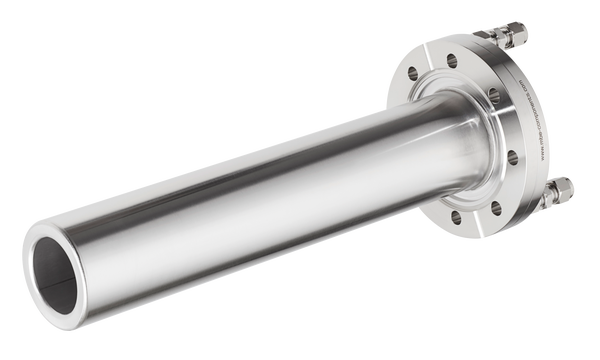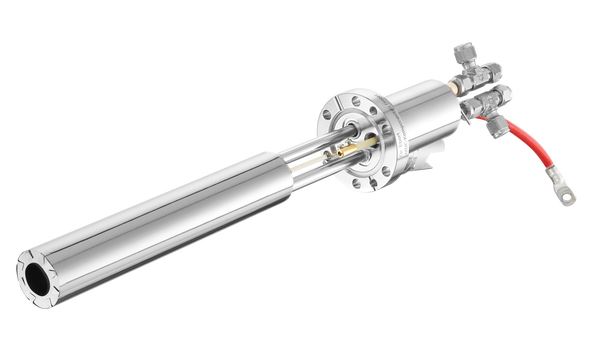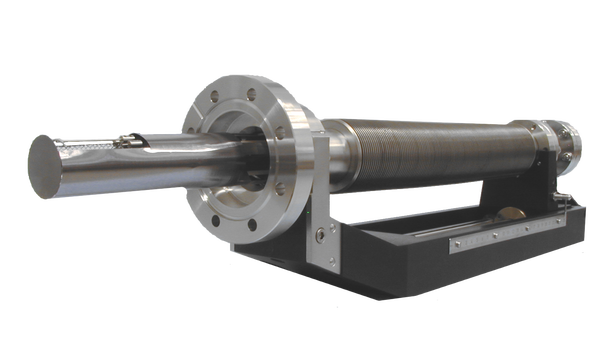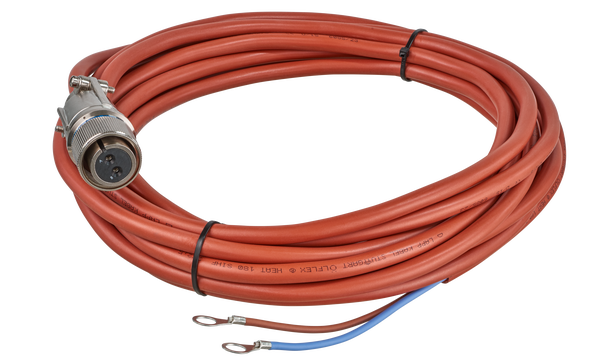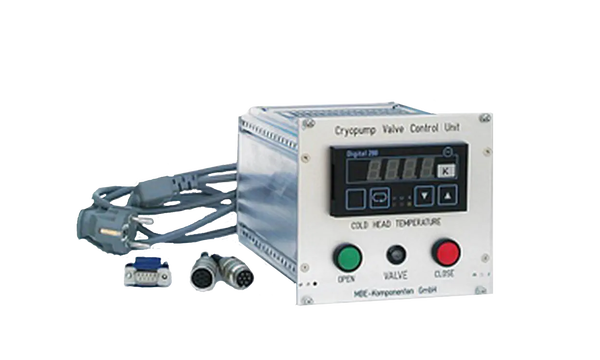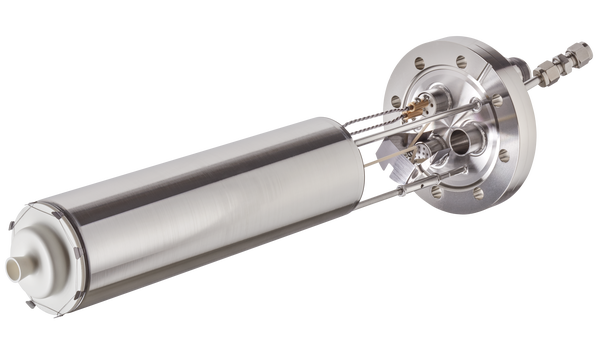- Cluster sources increase the capacity of UHV systems
- Customized with two independent and different types of effusion cells on a single flange
- Two individual shutters or multi-position shutter and additional cool tube available
- Minimized temperature crosstalk because of effective integrated water cooling
- Various crucible types and sizes available
- Very compact cell design
- Surprisingly low power consumption Datasheet
Introduction
The picture above presents a Dual Cluster Source typically used for organic material or for metal evaporation with evaporants like Au, Ag, Bi, Ga, In, etc.






Two independent cells with two 0.6 cm3 crucibles are tightly arranged on a single DN40CF (O.D. 2.75") flange. This compact design allows assembling two cells in only one single source port and thus increasing the capacity of the MBE system. Effective water cooling provides minimized temperature crosstalk between both cells. It is possible to run one cell e.g. at 1300°C while the other cell keeps its temperature at 150°C.
By default the “dual” cluster sources are designed as two-cell-clusters. However we are to supply customized solutions with three or more cells, e.g., Quad Cluster Sources QCS on a single mounting flange tailored to the customer’s need.
Dual Cluster Sources built on a DN40 CF (O.D. 2.75") flange comprise two crucibles and either one multi-position rotary motion shutter or two individual rotary shutters. Different crucible sizes, shapes, materials (see second foto on the right) and different thermocouples can be provided.
Dual Cluster Sources DCS 40-2x1-14-S with multi-position shutter
In this variant is implemented one multi-position rotary shutter for various open/closed shutter position combinations that can be regulated either manually or remote by a Multi-position Shutter Control Unit MSCU.
Dual Cluster Source DCS 40-2x1-14-2S with two individual shutters
Dual Cluster Source DCS 40-2x1-14-2S with two individual shutters
This solution comprises two independently adjustable non overlapping
shutters that allow individual closing or opening and establish a
further reduction of thermal interaction. They can shift positions
within an ambient tube.
Both shutters can be regulated manually or remote by a Rotary Pneumatic
Shutter Module RPM.
Dual Cluster Source DCS 40-2x1-14-S-T with multi-position shutter and cool tube
In order to shield the UHV chamber from spreading evaporant especially
while evaporating organic material at low temperatures the cool tube is
a reasonable option.
Diffuse evaporant material will deposit inside the cool tube wall while
only the sharp beam in straight direction will hit the substrate in a
well defined spot.
The cool tube option is available with two individual shutters, too.
( DCS 40-2x1-14-2S-T )
Application
The use of source clusters increases the capacity of your UHV-System, by using only a single port for two individual sources. In surface science application the product allows you to add material deposition features into your small sample preparation system or directly in a surface analysis system.
Both independent sources of the DCS are predestined for thin film applications or for doping applications (see DDS , the dual cluster cell that is explicitly optimized for doping applications ). Different thermocouple options for high temperature or low temperature heaters are available. Low temperature cells are used for organic material (type K or type C thermocouple).
Many combinations of effusion cells are possible within Source
Clusters.
For particular combinations or special designs like tilted angle
crucibles see
Customized Source Clusters .
| Mounting flange | DN40CF (O.D. 2.75") | |
| Dimensions in vacuum | Length : standard 220 mm (180-400 mm on request); Diameter : 36mm | |
| Distance source-sample | Typically 100 to 160 mm | |
| Bakeout temperature | 250°C | |
| Temperature sensor | Type K (Chromel/Alumel) | Type C (W5%Re/W26%Re) |
| Outgassing temperature | 1100°C | 1500°C |
| Operating temperature | 25-1000°C | 50-1400°C |
| Typical power consumption | 500°C @ 7 W / 4 A, 1100°C @ 51 W / 7 A, 1500°C @ 112 W / 10 A | |
| Crucibles | PBN, Quartz, Al2O3 , etc.; Nominal charge 600 mm3 | |
| Cooling | Water cooled block, 30 l/h cooling water flow Low temperature crosstalk: one cell 1300°C / second cell 150°C possible | |
| Shutters | integrated multi-position rotary shutter ( S ) or individual rotary shutters ( 2S ) | |
Power graph
The power graph on the right shows the temperature range of a DCS 40 as a function of the power consumption.
It shows typical values of one of the two effusion cells of a DCS 40 while the second cell is unimplemented.
Additionally it gives information about the reasonable dimensioning of the required power supply.

Crucibles
The nominal capacity of a crucible is 0.6 cm3 (600 mm
3 ). The standard crucible material is PBN (
CRU 1-14 ), but other crucible materials like
PG, quartz, Al2O3 are also available.
A quartz crucible is typically used for organic material and some low
temperature application. Pyrolytic graphite (PG) is available for some
special evaporation materials like CaF2 . Other crucible
materials are available on request.
Dimensions

Specific data
For general information on CF mounting flanges see Flange and Gasketdimensions .
| Product | CF flange | Nominal capacity | Lip diameter | Shutter* | Cool tube | Filament type | Thermocouple | Crucible material** | UHV dimensions*** [mm] | max. electrical [W]/[A] | Power supply product code | Crucible product code | |
|---|---|---|---|---|---|---|---|---|---|---|---|---|---|
| [cm³] | [mm] | Type | Type | [mm] / [mm] | [W] / [A] | Product code | Product code | ||||||
| DCS | 40 - | 2x1 - | 14 - | S - | SF¹ - | C- | P - | LxxxD36 | 100 / 10 | 2x PS 15-10-C | CRU 1-14 | ||
| DCS | 40 - | 2x1 - | 14 - | S - | SF¹ - | K- | Q | LxxxD36 | 50 / 7 | 2x PS 15-10-C | CRU 1-14 | ||
| DCS | 40 - | 2x1 - | 14 - | 2S - | SF¹ - | C- | P - | LxxxD36 | 110 / 10 | 2x PS 15-10-C | CRU 1-14 | ||
| DCS | 40 - | 2x1 - | 14 - | 2S - | SF¹ - | K- | Q | LxxxD36 | 50 / 7 | 2x PS 15-10-C | CRU 1-14 | ||
| DCS | 40 - | 2x1 - | 14 - | S- | T- | SF¹ - | C- | P - | LxxxD36 | 110 / 10 | 2x PS 15-10-C | CRU 1-14 | |
| DCS | 40 - | 2x1 - | 14 - | S - | T- | SF¹ - | K- | Q | LxxxD36 | 50 / 7 | 2x PS 15-10-C | CRU 1-14 | |
| DCS | 40 - | 2x1 - | 14 - | 2S- | T- | SF¹ - | C- | P - | LxxxD36 | 110 / 10 | 2x PS 15-10-C | CRU 1-14 | |
| DCS | 40 - | 2x1 - | 14 - | 2S - | T- | SF¹ - | K- | Q | LxxxD36 | 50 / 7 | 2x PS 15-10-C | CRU 1-14 |
* rotary shutter possible on same flange ¹ alternatively CL ** P=PBN; Q=Quartz; other materials on request *** specify UHV length L with order
Please contact us if you need any other source configuration.
*Example for Product code:
*
e.g. **DCS 40-2x1-14-S-T-SF-C-P-L220D36
** is a dual cluster source on a DN40CF flange, with two 0.6cm 3 PBN crucibles (lip diameter 14 mm), integrated rotary shutter, cool tube, standard filament heaters, type C thermocouple, in-vacuum length 220 mm and diameter 36 mm.



